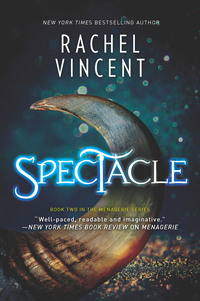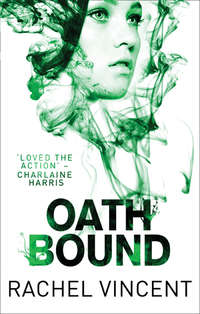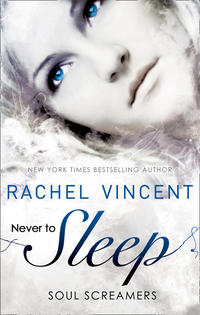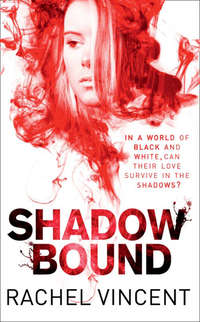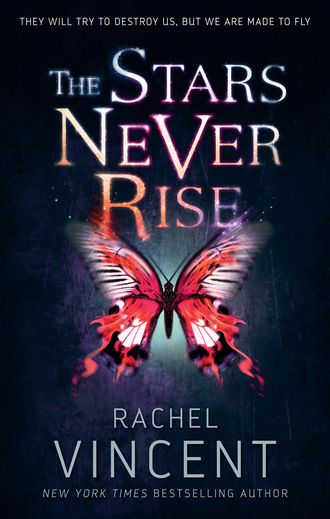
Полная версия
The Stars Never Rise
I had to go.
“Not a problem.” I grabbed the chain-link and started hauling myself up the fence. I could not afford a home visit from the Church. Fortunately, the night clerk—Billy, the manager’s nephew—hadn’t recognized me. “I’m not making a statement.”
“You’re not?”
I could hear the question in his voice, but I couldn’t see his face because I was already halfway up the fence. “Thanks for that.” I let go of the chain-link with one hand to gesture at the degenerate below. Then I climbed faster and threw one leg over the top.
“Wait!” he said as I lowered myself from link to link on the other side of the fence. “Who are you?”
“Who am I?” The rogue teenage exorcist wanted to know who I was? “Who are you?”
“I’m … just trying to help. Why was it following you?”
Following me? The goose bumps on my arms had nothing to do with the predawn cold.
“I guess my soul smelled yummy.” Or, more likely, I would have been a meal of convenience—few people were out and about so early in the morning.
Two feet from the ground, I let go of the fence and dropped onto the concrete. When I stood, I found him watching me, both hands curled around the chain-link between us.
The sirens were wailing now, and the sun was almost up. I needed to go. But first, I had to see …
I stuck my hand through the fence—it barely fit—and reached for his hood. He let go of the chain-link and stepped back, startled. Then he came closer again. I pushed the hood off his head, and my gaze caught on thick brown waves as my fingers brushed them.
Then I saw his eyes. Deep green, with a dark ring around the outside and paler flecks throughout. For just a second, I stared at them. I’d never seen eyes like that. They were beautiful.
Then the wail of the siren sliced through my thoughts with a new and intrusive volume as the wall of the alley was painted with strobes of red and blue. The Church had arrived.
“Gotta go.” I pulled my arm through the fence too fast, and metal scraped the length of my thumb.
“Wait! We need to talk.”
“Sorry. No time. Thanks again for … you know. The demon slaying.” I bent to grab the bag of clothes. Then I ran.
At the mouth of the alley, I looked back, but the boy was gone.
The Grab-n-Go parking lot was alive with flashing lights and crawling with cops in ankle-length navy Church cassocks and stiff-brimmed hats. Billy, the night clerk, stood in the middle of the chaos, gesturing emphatically toward the alley while three different officers tried to take his statement. A second later, two of the three pocketed their notebooks and headed into the alley, slicing through the last of the predawn shadows with bright beams from their flashlights.
One squatted next to the dead degenerate while the other aimed his flashlight down the alley. I ducked around the corner in time to avoid the beam, and for a moment I just stood there, clutching the paper bag to my chest, trying to wrap my mind around everything that had just happened.
A degenerate in New Temperance.
A rogue exorcist with beautiful green eyes.
A parking lot full of cops.
And they were all looking for me.
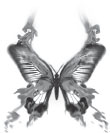
TWO
Dawn had officially arrived by the time I crossed my crcked patio and stepped into the kitchen, though the sun had yet to rise over the east side of the town wall. My heart was still pounding. A siren wailed from several blocks away. When I closed my eyes, I saw the monster looming over me, snapping inhuman jaws inches from my nose. I shut the back door softly, then dropped the bulging paper bag next to a duffel full of our own dirty laundry.
The clerk couldn’t identify me. The rogue exorcist didn’t know my name. The Church would not come knocking.
I repeated it silently but still had trouble believing it.
The clock over the stove read 6:14. School started in an hour and a quarter.
On my way through the kitchen, I noticed my mom’s purse on the table. I wasn’t sure whether to be relieved or pissed off that she’d returned home while I was fighting a degenerate in the alley behind the Grab-n-Go. I glanced into the living room, empty except for the scarred coffee table, worn sofa, and two mismatched armchairs. For the first time in weeks, she hadn’t passed out on the couch.
In the short, narrow hallway, I pushed her door open slowly to keep it from creaking, then sighed with relief. She’d made it to the bed this time. Mostly. Her arm and her bare right leg hung off the mattress. Her left leg was bare too, of course, but somehow she’d gotten her pants off without removing that one shoe.
Her legs were getting thinner—too thin—and so was her hair. Her kneecaps stood out like bony mesas growing beneath her skin, and her eyebrows were practically nonexistent. She’d been drawing them on for most of the past year, until she’d given up makeup entirely a few weeks ago. She didn’t go out during the day, anyway; she “worked” all night now, then stumbled home at dawn.
There was a spot of blood on her pillow, and more of it crusted on her upper lip. Another nosebleed. She was killing herself. Slowly. Painfully, from the looks of it.
“One more year, Mom,” I whispered as I pulled her door shut softly. “I just need one more year from you.”
In the room I shared with Melanie, our radio alarm had already gone off, and as usual, my little sister hadn’t noticed. I swear, a demon horde could march right through our house and she’d sleep through the whole thing.
“… and I, for one, am looking forward to a little sun!” the DJ said as I dropped my oversized coat on the floor. It thumped against the carpet, which is when I remembered the pilfered cans of stew I’d meant to leave in the kitchen. “In other news, Church officials in New Temperance are expected to announce their choice for headmaster of the New Temperance Day School today, a job vacated just last month when Brother Phillip Reynolds accepted a position in Solace….”
I listened for a couple of minutes, waiting to see if they’d announce a degenerate attack in New Temperance and the mysterious boy and girl spotted in the alley. When that didn’t happen, I poked the alarm button, relieved that I hadn’t yet made the news, and the DJ’s voice faded into blessed silence.
That alarm radio was the only thing on my scratched, scuffed nightstand. It was the last thing I saw before I fell asleep and the first thing I saw every morning. The clock divided my days into strict segments devoted to sleep, school, homework, housework, and real work. I had little time for anything else.
My sister’s nightstand was covered in books. Not textbooks or the Church-approved histories and biographies available in the school library. Mellie had old, thick hardcover volumes, some with nothing but black-and-white print stories, others with brightly colored strip illustrations of people with ridiculous powers, speaking in dialogue bubbles over the characters’ heads. She borrowed them from Adam Yung’s dad, who had a secret collection of prewar stuff in his basement.
The Church hadn’t officially outlawed secular fiction, but they had a way of making things like that unavailable to the general public. Right after the war against the Unclean, they’d recycled entire public library collections to reuse the materials. And after they’d brought down all cellular transmission towers—to keep demons from communicating with one another en masse—people had no use for their portable phones and communication devices, so there were recycling drives for those too.
Collections like Mr. Yung’s were rare. When we were kids, I’d read his stories with Melanie, curled up in our bed, dreaming of eras and technologies that were long past by the time we were born.
Then I grew up and realized that was all those stories ever were. Dreams. I lived in the real world, where Mellie was only a part-time citizen.
“Time to get up, Mel.” Standing, I gave my sister’s shoulder a shove. She groaned, and I grabbed the towel hanging over the footboard of the bed, then trudged into the hall.
My shower was cold—the pilot light on the hot water heater had gone out again—and we were out of soap, so I had to use shampoo all over. The suds burned the fresh scrapes on my lower back, a vivid reminder of my near death in the alley, and when I got back to the bedroom, shivering in my towel, my sister was still sound asleep in the full-size bed we shared.
“Melanie. Get up.” I nudged the mattress with my foot, and she rolled onto her stomach.
“Go away, Nina.” She buried her face in the pillow without even opening her eyes.
“Up!” I tossed the blanket off her, holding my towel in place with one hand, and my sister finally sat up to glare at me.
“I’m not going. I’m sick.” She swiped at yesterday’s mascara and eyeliner, already smeared across both her pale cheek and her pillow.
I felt her forehead with the back of one hand while new goose bumps popped up on my arms, still damp from the shower. “You’re not hot. Get up. Or would you really rather be here with Mom all day?”
Melanie mumbled something profane under her breath, but then she stumbled into the hall. Even half-asleep, she remembered to tiptoe over the creaky floorboard in front of Mom’s room on her way to the bathroom.
When we let our mother sleep, we were rewarded with benign neglect. The alternative was much less pleasant.
I was buttoning my school uniform shirt when Melanie came back from the bathroom, pulling a brush through her long, pale hair still dripping from the shower. She looked her age, with her face scrubbed and shiny. Fifteen and fresh. Innocent. Without the eyeliner she’d taken from the Grab-n-Go and the lipstick our mother had forgotten she even owned, Mellie looked just like all the other schoolgirls in our white blouses and navy pants—shining beacons of purity in world that had nearly been devoured by darkness a century ago.
We were living proof that the Church knew best. That the faithful only prosper under the proper spiritual guidance. And about a dozen other similar lines of bullshit the sisters made us memorize in kindergarten.
“Today’s the day,” I said when she handed me the brush. I pulled it through my own thicker, darker hair. “I’m really going to do it.” I’d almost forgotten what today was, thanks to the demon in the alley, but cold showers have a way of bringing reality into crisp focus.
“Do what? Admit that you’re a hopeless stick-in-the-mud who never lets herself have any fun?” She tugged the last pair of school pants from a hanger in the closet and shoved her foot through the right leg. Thank goodness we wore the same size, because we never could have afforded two sets of uniforms on our own, and if the Church found out our mother wasn’t working, they’d take us away.
Melanie wouldn’t make it in the children’s home. The sisters were too watchful, and she had become mischievous and careless under what the Church would characterize as neglect on our mother’s part.
I’d characterize it like that too. But I’d say it with a smile.
“I think you’re having enough fun for both of us, Mel.” Sometimes it didn’t feel possible that we were only a year and a half apart. It’s not that Melanie didn’t pull her own weight; it’s that she had to be reminded to help out. Constantly. If I didn’t beg her to take the towels to the laundry on Saturdays, we’d have to air dry all week long.
“So, what’s so great about today?”
I didn’t get eaten in the alley behind the Grab-n-Go. But there were only so many secrets my sister could keep at one time, and our mother took up most of those spots all on her own.
I took a deep breath. Then I spat the words out. “I’m going to pledge.”
Melanie froze, her pants still half buttoned. “To the Church?”
“Of course to the Church.” I tucked in my blouse, then pulled hers off its hanger. “We talked about this, Mellie.”
“I thought you were joking.” She grabbed a bra from the top drawer and took the shirt I held out by the neatly starched collar.
“I don’t have time for jokes. Why else would I spend all my free time working in the nursery?”
“For the money.” As she buttoned her blouse I brushed sections from the front of her hair to be braided in the back. She hated the half braid, but it made her look modest and conventional, and sometimes that demure disguise was the only thing standing between my mischievous sister and the back of the teacher’s hand. “The same reason I watch Mrs. Mercer’s brats after school and tutor Adam Yung on Saturdays.”
I glanced at her in the mirror with eyebrows raised. “You get credit for the babysitting.” The Mercer kids really were brats, and she wouldn’t have gone near them without a cash reward. “But we both know why you tutor Adam, and it’s not for the money.” He didn’t even pay her in cash—Adam usually came bearing a couple of pounds of ground beef or, in warmer weather, a paper bag of fruits and vegetables from his mom’s garden. Which we’d learned to ration throughout the week.
He’d never said anything, but I always got the impression that his mother sent payment in the form of perishables to make sure our mother couldn’t spend Mellie’s wages on her “medicine.” And to make sure we ate.
“Stop changing the subject.” She scratched her scalp with one finger, loosening a strand I’d pulled too tight. “You want to pledge to the Church just so you can teach?”
I didn’t want to pledge to the Church for any reason. But … “That’s the way it’s done, Mellie.” All schools were run by the Church, and all teachers were either ordained Church pledges or fully consecrated senior members. Same for doctors, police, soldiers, reporters, and any other profession committed to serving the community.
Adam’s dad said they used to be called civil servants—back when there was civil government.
Melanie took the end of her braid from me. “Don’t you think the world has enough teachers?”
“No, as a matter of fact—”
“You know what the world really needs?” She turned to watch me through eyes wide with excitement as she wound the rubber band around the end of her hair. “More exorcists. I mean, if you’re determined to damn yourself to a life of servitude, communal living, and celibacy, wouldn’t you rather be slaying demons than wiping noses on kids that aren’t even yours? You’re gonna need some way to work off all that sexual frustration.”
“Don’t swear, Mel,” I scolded, but the warning sounded hollow and hypocritical, even to my own ears. We both knew better than to curse in public, but there was no one at home to hear or report us. “Profanity is a sin.”
Melanie rolled her eyes. “Everything worth doing is a sin.”
“I know.” And honestly, it was kind of hard for me to worry about the state of my immortal soul when my mortal body’s need for food and shelter was so much more urgent.
I plucked the two slim silver rings from the top of our dresser and tossed her one. Melanie groaned again, then slid her purity ring onto the third finger of her right hand while I did the same. “Nina Kane” was scratched into mine because I’d “misplaced” it four times during the first semester of my freshman year and Sister Hope had engraved my name on the inside to ensure that it would be easily returned to me.
Ours weren’t real silver, and they certainly weren’t inlaid, like Sarah Turner’s purity ring. Ours were stainless steel, plucked from the impulse-buy display at the Grab-n-Go one afternoon when I was fourteen, while Melanie distracted the clerk by dropping a half-gallon of milk in aisle one.
Fortunately, the sisters didn’t care where the rings came from or what they’d cost, so long as we wore them faithfully beginning in the ninth grade as a symbol of our vow to preserve our innocence and virtue until the day we either gave ourselves to a worthy husband or committed to celibate service within the Church.
I knew girls who took that promise very seriously.
I also knew girls who lied through their teeth.
I didn’t know a single boy who’d ever worn a purity ring. Evidently, their virginity was worth even less than the stolen band of steel around my finger.
I grabbed my satchel on my way out of the room, and our conversation automatically paused as we passed our mother’s door. In the kitchen, I pulled the last half of the last loaf of bread from an otherwise empty cabinet, and Melanie frowned with one hand on the pantry door, staring at the calendar I’d tacked up to keep track of my erratic work schedule—I worked whenever the nursery needed me. “What’s today?”
“Thursday.”
“Thursday the fourth?” Her frown deepened, and I had to push her aside to grab a half-empty jar of peanut butter from the nearly bare pantry. “It can’t be the fourth already.”
“It is, unless four no longer follows three. Why?” I glanced at the calendar and saw the problem. “History test?”
“What?” Melanie sank into a rickety chair at the scratched table. “Oh. Yeah.”
“You didn’t study?” I set a napkin and the jar of peanut butter in front of her, then added a butter knife and one of the two slices of toast as they popped up from the toaster.
She shrugged. “It’s just a fill-in-the-blank on the four stages of the Holy Reformation.” But the way she spread peanut butter on her bread, her gaze only half focused, said she was worried.
“And those stages would be …?”
Melanie sighed. “The widespread decline of common morals, the subsequent onslaught of demonic forces, the glorious triumph of the Church over the worldwide spiritual threat, and the eventual unification of the people under a single divine ministry.” She was quoting the textbook almost verbatim.
“Good. Come on.” I took the knife from her and made my own breakfast, then tossed Melanie a modest navy sweater and herded her out the back door, where the town perimeter wall was easily visible between the small houses that backed up to ours. The wall was solid steel plating fifteen feet tall, topped with large loops of razor wire. In the middle of the night, I heard the metal groan with every strong gust of wind. I saw the glint of sun on razor wire in my dreams.
But clouds had rolled in since my predawn activities, and the sky was now gray with them.
“December eighth, 2034,” I said around a mouthful of peanut butter and bread as we rounded the house and stepped over the broken cinder block hiding the emergency cash I kept wrapped in a plastic bag. If Mom knew we had money, she’d spend it on something less important than heat and power, two resources I greatly valued.
“Um … the first televised possession, caught on film at a holiday parade, before the Church abolished public television to support and protect the moral growth of the people.” Melanie shoved one arm into her sweater sleeve, then transferred her toast to the other hand and pulled the other half of her cardigan on over her satchel strap. “So, how dangerous could secular programming have been, anyway? It’s just a bunch of videos, like the discs in Mr. Yung’s basement, right? Stories being acted out, like we used to do when we were kids?”
“I guess.” But according to the Church, those videos tempted people to sin.
Mr. Yung had an old TV and a disc player that still worked. I’d seen one of his videos once, but the disc was badly damaged, so I only caught glimpses of couples swaying in sync with one another, dressed in snug clothes. At the time, I’d been scandalized by the sight of boys and girls in open physical contact with one another—those would be secret shames in our postwar world. But the adults in the video didn’t seem to care, and no one was driven to wanton displays of flesh or desire, that I could see.
There was no sound on the video, though, so I couldn’t hear what kind of music they’d had or what they were saying.
Maybe the sin and temptation were more obvious in the parts I couldn’t hear.
We turned left on the cracked sidewalk in front of our house, and I eyed the dark clouds in the sky, struggling to bring my thoughts back on task. “September twenty-ninth, 2036.”
Melanie held her toast by one corner. She still hadn’t taken a bite. “The first verified exorcism. Established worldwide credibility for the Unified Church, whose exorcist—the great Katherine Abbot—performed the procedure in front of a televised audience of millions.”
“Good. June—”
“Did you know that wasn’t even her real name? “Melanie said suddenly.
“What wasn’t whose name?” We turned left again and followed the railroad tracks between the backyards of the houses a block over from ours. The train hadn’t run since long before I was born, but little grass grew between the rails, which made it an easy shortcut on the days we were running late. Which was most days, thanks to my sister.
“Katherine Abbot. Her name wasn’t really Katherine. The Church renamed her because they thought her real name didn’t sound serious enough, or holy enough, or something like that.”
“So what was her real name?”
Melanie shrugged, and her uneaten toast flopped in her hand. “I don’t know.”
“Then how do you know it wasn’t Katherine?”
“Adam told me.”
“Adam, who needs your help to add double digit numbers?” I said as we cut through the easement between two yards and back onto the street.
“He’s bad at math, not history. His dad says the Church does it all the time—changes facts. Mr. Yung says history is written by the victor, and if the elderly don’t pass down their memories, eventually there won’t be anyone else left alive who knows how the war was really fought.”
I stopped cold on the sidewalk and grabbed her arm, holding so tight she flinched, but I couldn’t let go. Not until she understood. “Melanie, that’s heresy,” I hissed, glancing around at the houses on both sides of the road. Fortunately, the street was deserted. “If Adam Yung and his father want to risk their immortal souls”—or more accurately, their mortal lives—”by questioning the Church, that’s their business. But you stay out of it.”
Skepticism and profanity were largely harmless in private, and goodness knows I couldn’t claim innocence on either part. But the more often they were indulged, the more likely they were to be overheard. And reported. And punished.
“You’re going to have to tutor him in public. At the laundry, or the park, or something.” Anywhere public exposure would keep him from filling my impressionable sister’s head with dangerous thoughts she couldn’t resist sharing with the rest of the world.
I wanted to tell her to stop tutoring him, but frankly, we needed the food.
“Why aren’t you eating?” I glanced pointedly at her untouched breakfast.
“I told you. I don’t feel good.” She scowled and pulled her arm from my grip. “Next date.”
“Um … June 2041.” I pushed her toast closer to her mouth, and she finally took a bite.
“The Holy Proclamation, establishing the Unified Church as the sole political and spiritual authority,” she said, with her mouth still full.
“Okay, let’s backtrack.” I made a gesture linking her breakfast and her face, and Melanie reluctantly took another bite. “May twelfth, 2031.”
“The Day of Great Sorrow.” Her face paled, and she chewed in solemn silence for several seconds before elaborating. “The day the number of stillbirths officially surpassed the number of live births. A day of mourning the world over. The Day of Great Sorrow led to the realization that the well of souls had run dry, which led to the discovery of demons among us. Which then led to the Great Purification, undertaken by the Unified Church, and the dissolution of all secular government in the Western Hemisphere. Right?”


